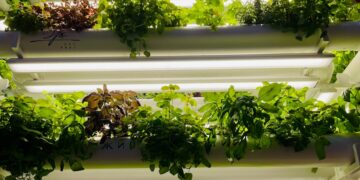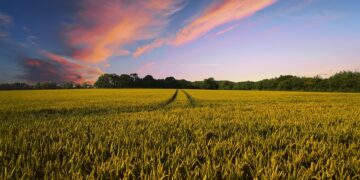The Future of Farming: Implementing Sustainable Livestock Practices for a Greener Tomorrow
Farming has long been a cornerstone of human civilization, providing us with the food and resources we need to sustain ourselves. However, traditional farming practices have often come at a cost to the environment, with intensive agriculture and livestock farming contributing to deforestation, greenhouse gas emissions, and water pollution. As we look towards the future, it is clear that we need to adopt more sustainable practices in order to protect our planet and ensure a greener tomorrow.
The Importance of Sustainable Livestock Practices
Livestock farming is a major contributor to environmental degradation, with the production of meat and dairy products accounting for a significant portion of global greenhouse gas emissions. In addition, intensive livestock farming can lead to deforestation, soil erosion, and water pollution, as well as the depletion of natural resources such as water and land.
By implementing sustainable livestock practices, we can reduce the environmental impact of livestock farming and help to mitigate climate change. Sustainable livestock practices focus on promoting animal welfare, reducing greenhouse gas emissions, and minimizing waste and resource use. By adopting these practices, farmers can help to protect the environment and ensure the long-term viability of their operations.
Key Sustainable Livestock Practices
There are a number of key sustainable livestock practices that farmers can implement to reduce their environmental impact and promote a greener future. These practices include:
Grass-fed Livestock
Grass-fed livestock are raised on pasture rather than in feedlots, allowing them to graze on natural grasses and forage. This not only improves the welfare of the animals but also helps to reduce greenhouse gas emissions, as pasture-based systems require less energy and produce fewer emissions than intensive feedlot operations.
Rotational Grazing
Rotational grazing involves moving livestock between different paddocks or fields on a regular basis, allowing the land to rest and recover between grazing periods. This helps to prevent overgrazing, improve soil health, and promote biodiversity, while also reducing the risk of soil erosion and water pollution.
Manure Management
Proper manure management is essential for reducing the environmental impact of livestock farming. By composting or recycling manure, farmers can reduce greenhouse gas emissions, improve soil fertility, and minimize the risk of water contamination. In addition, manure can be used as a valuable source of nutrients for crops, reducing the need for synthetic fertilizers.
The Benefits of Sustainable Livestock Practices
Implementing sustainable livestock practices offers a number of benefits for both farmers and the environment. By reducing greenhouse gas emissions, improving soil health, and promoting biodiversity, farmers can help to protect the environment and ensure the long-term sustainability of their operations. In addition, sustainable livestock practices can help to improve animal welfare, reduce waste and resource use, and enhance the quality of meat and dairy products.
By adopting sustainable livestock practices, farmers can also reduce their reliance on synthetic inputs such as fertilizers and antibiotics, reducing their costs and improving the profitability of their operations. In addition, sustainable livestock practices can help to build resilience to climate change, ensuring that farmers are better able to adapt to changing environmental conditions and market demands.
Common Questions About Sustainable Livestock Practices
What are the main challenges of implementing sustainable livestock practices?
One of the main challenges of implementing sustainable livestock practices is the upfront costs and investments required to transition to more sustainable systems. Farmers may need to invest in new infrastructure, equipment, and training in order to adopt sustainable practices, which can be a barrier for many small-scale producers. In addition, changing consumer preferences and market demands can also pose a challenge for farmers looking to transition to more sustainable practices.
How can farmers benefit from implementing sustainable livestock practices?
Implementing sustainable livestock practices can benefit farmers in a number of ways, including reducing their environmental impact, improving animal welfare, and enhancing the quality of their products. By adopting sustainable practices, farmers can also reduce their costs, improve the profitability of their operations, and build resilience to climate change and market fluctuations.
What are some examples of successful sustainable livestock practices?
There are many examples of successful sustainable livestock practices around the world, including grass-fed livestock systems, rotational grazing, and organic farming. These practices have been shown to reduce greenhouse gas emissions, improve soil health, and promote biodiversity, while also enhancing the welfare of animals and the quality of meat and dairy products.
Conclusion
As we look towards the future of farming, it is clear that we need to adopt more sustainable practices in order to protect the environment and ensure a greener tomorrow. By implementing sustainable livestock practices such as grass-fed systems, rotational grazing, and proper manure management, farmers can reduce their environmental impact, improve animal welfare, and enhance the quality of their products. By working together to promote sustainable farming practices, we can build a more resilient and sustainable food system for future generations.
It is essential that we prioritize sustainable livestock practices in order to protect our planet and ensure a greener future for all. By implementing these practices, farmers can reduce their environmental impact, improve animal welfare, and promote a more sustainable and resilient food system. Together, we can work towards a greener tomorrow for all.












